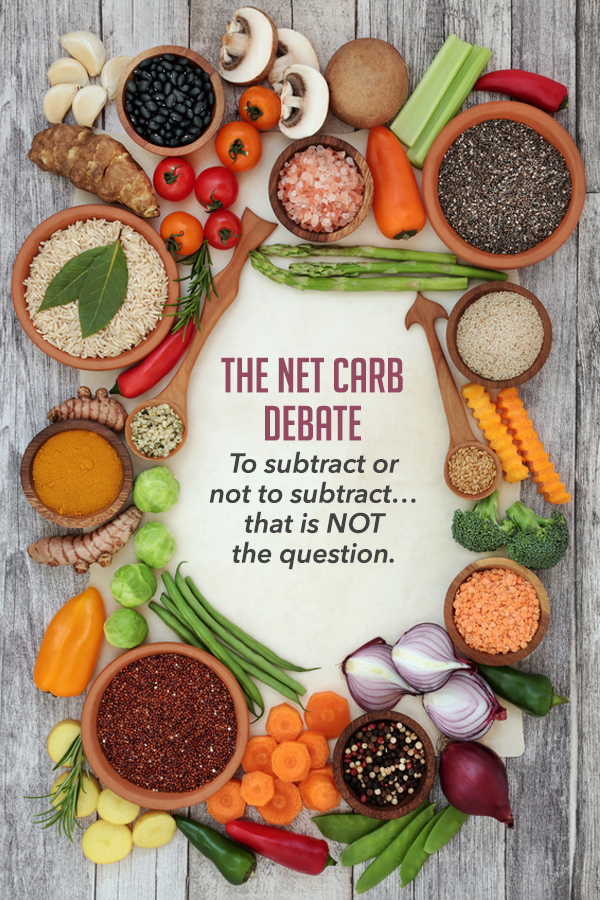
When a Carb is Not a Carb: The Net Carb Debate
September 11, 2019To subtract or not to subtract…that is not the question.
Paying attention to what you are eating does not have to involve math. That might take far too much time and effort, particularly if the time is spent calculating “net carbohydrates.” Net carbohydrates as a concept that is important to understand.
Net carbohydrates represent the number of carbohydrates that are not derived from the dietary fiber in food. If you read a package, you can calculate it by Total Carbohydrates – Dietary Fiber = Net Carbohydrates.
The critical concept, however, is that eating foods rich in dietary fiber relative to other carbohydrates is important. And more important than the net carb calculation at each meal is deciding to make healthy choices by choosing the types of foods that are protein, nutrient, and fiber-rich.
Focus on Protein and Carbohydrate-Containing Foods
When carbohydrates are digested by the body in a form packaged with another nutrient (e.g fiber, protein, fat) they go through the system more slowly causing less of a spike in blood sugar and a more measured insulin response. Since protein is the top priority nutritionally after bariatric surgery, focusing on protein and carbohydrate-containing foods like whole grains, legumes, nuts, seeds, and dairy can provide needed energy as well as contribute to the protein requirements for the day.
These carbohydrates, aside from those in dairy, are also sources of dietary fiber. Eating a diet rich in fiber leads to a sense of fullness and satisfaction that is important to achieving a healthy weight. Furthermore, regular fiber intake can lead to a beneficial bacterial profile in the colon that can promote weight loss and healthy digestion.
After bariatric surgery, choosing nutrient dense and fiber rich carbohydrate sources is far more practical than requiring a math problem with every meal.
If a patient is calculating a “net carb,” that involves reading the nutrition label or knowing the exact nutritional information and serving size of the food being eaten. That is a lot of detailed information to know and can be impractical when cooking, dining out, or in social situations. Further, if a patient is spending a great deal of time reading a package’s nutrition label, the diet is likely not focused on whole foods to start with which can present other future health problems.
Healthy Eating Can Be Impactful After Surgery
That is where following the more general, easier to remember guidelines for healthy eating can be impactful after surgery. For instance, there is no specific amount of carbohydrates recommended for the bariatric patient. The current recommended daily allowance (RDA) of carbohydrates for adults in the general population is 130 grams per day.
Bariatric patients are instructed to avoid breads, rice, and pasta. This is for several reasons. One is that these foods can expand in the stomach and cause discomfort.
The expansion of bread, rice or pasta in the stomach can take up valuable real estate in a bariatric pouch or bariatric stomach that could be better taken up by protein-rich foods, nutrient-dense, and fiber-rich produce. Lastly, bread, rice, and pasta are energy-dense foods, so the regular intake of these foods may make weight loss a challenge.
Bariatric patients can obtain more than adequate carbohydrates from a protein-focused diet that contains dairy products, legumes, nuts, seeds, whole grains, fruits, and vegetables. Plant-based carbohydrates provide energy packaged with fiber and sometimes protein and fat.
It would be difficult for a bariatric patient to exceed the RDA for carbohydrates if they do two things. First, follow the recommendations to avoid most bread products, rice, pasta and avoid frequent intake of starchy fruits and vegetables like potatoes.
Second, choose to eat a diet rich in vegetables, fruits, legumes, nuts/seeds, and dairy. This dietary pattern would also lend itself to a lower “net carb” intake. Following simple guidelines for a generally healthy diet and fiber-rich carbohydrates might make it unnecessary to do any math related to net carbohydrates or to count carbohydrates at all.
The Net Carb Calculation Summary
Performing the net carbohydrate calculation can confirm what you already know: packaged foods are generally not a good source of dietary fiber and can make maintaining a healthy weight difficult. Knowing which foods contain carbohydrates and which foods are a good source of fiber and basing the diet around those foods can lead to better health and easier weight maintenance for the bariatric patient.
 | ABOUT THE AUTHOR Kelly Gafni, MPH, RD is an experienced program coordinator and has a demonstrated history of working in the hospital and health care industry. She is currently the Bariatric Nutrition Coordinator at Marina Weight Loss Center located in Marina Del Ray, California. She is skilled in Nutrition Education as well as in Community Health, Nutrition, Nutritional Counseling, and Hospitals. She is a strong community and social services professional and graduated from the UCLA Extension in 2010. |




